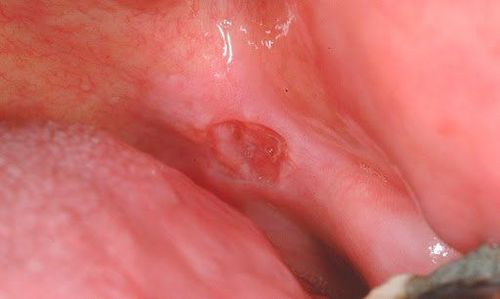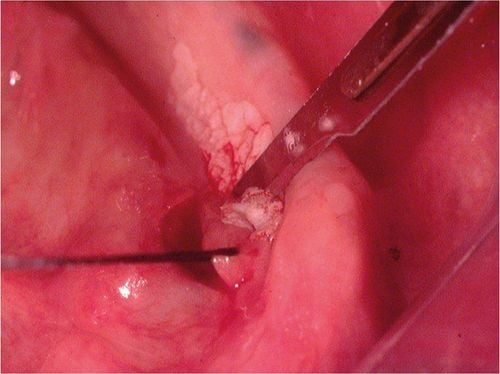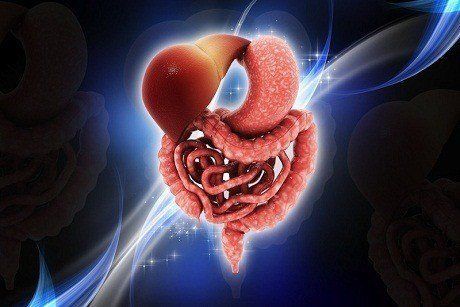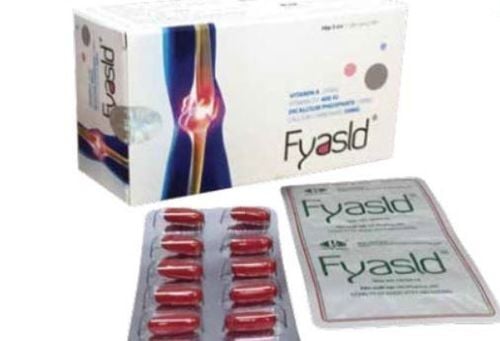This is an automatically translated article.
Oral cancer is a malignant lesion that occurs in the oral cavity. If detected early, oral cancer can be completely cured by surgery. Therefore, when detecting signs suggestive of oral cancer, patients need to be examined early for timely treatment.
1. What is oral cancer?
Oral cancer or oral cavity cancer is a disease that occurs in the lips, gums, tongue, roof of the mouth, inside the cheeks or the soft floor under the tongue. If the disease affects the tonsils, upper throat, or soft palate (where the roof of the mouth meets the throat), it is called oropharyngeal cancer.
2. Signs of oral cancer
The most common symptoms of oral cancer include:
Sores inside the cheeks or lips that don't heal; A red-white lump or patch may be palpable in the mouth; Teeth or dentures may become loose for no apparent reason; Other signs are mouth numbness, pain, bleeding, or weakness in the mouth; Voice changes, ringing in the ears, and sore throat that don't go away.

Hình ảnh ung thư khoang miệng với vết loét không lành trong má
3. Who is at risk for oral cancer?
Women and people over 45 are more likely to get oral cancer, although it can occur at any age. People with fair skin are more likely to get lip cancer. Some studies show that people with weakened immune systems (advanced age or HIV disease) have a higher risk of oral cancer.
Some other risk factors that can put you at risk for oral cancer include:
Smoking: Nearly 90% of people with head or neck cancer use tobacco or are exposed to secondhand smoke. All drugs can increase the risk of cancer, including cigarettes, snuff, chewing tobacco or cigars. Drinking alcohol: Alcohol can increase your chances of getting the disease, especially if you drink a lot on a regular basis (more than 1 or 2 drinks a day). If you also use alcohol and tobacco at the same time, the incidence increases even more, especially after the age of 50. HPV infection: Patients usually get the human papillomavirus (HPV) through sexual contact, including oral sex. There is some evidence that viral infections lead to cancers at the base of the tongue or in the tonsils. The HPV vaccine can protect against the viruses that cause oral cancer. To reduce your risk of HPV infection, use a condom or dental patch every time you have sex.
4. How is oral cancer diagnosed?
Your doctor will use the following methods to diagnose oral cancer:
Biopsy: Doctors and dentists usually find oral cancer during a routine physical exam. If they notice signs of cancer, they will look closely inside the patient's mouth and throat to look for oral cancer. If anything unusual is found, the doctor will order a biopsy to help confirm the diagnosis or rule out cancer. This is an effective way to tell if a tumor is cancerous. Your doctor will take a small tissue sample and send it to a lab for testing. They may use a needle, scraper, or minor surgery to cut off part of the tissue. In addition, tissue biopsy also helps to find the HPV virus. The results will help your doctor determine the extent of your cancer and the best treatment options. People with HPV-related cancers tend to have better treatment than people with other types of cancer. Imaging: Your doctor may use different imaging tests to look at the organs and structures around your mouth, including X-rays, MRI, CT, ultrasound, and PET scans. Your doctor may use one or more methods at the same time to look for pictures of oral cancer, monitor treatment, or check if the cancer has returned.

Sinh thiết giúp bác sĩ chẩn đoán bệnh ung thư khoang miệng chính xác
5. How is oral cancer treated?
5.1. Surgery to remove the tumor This is often the first treatment a doctor prescribes, especially when the disease is in its early stages. The doctor will try to remove the tumor as well as an area or margin of tissue around it to make sure that all the cancer cells are gone. In some cases, the patient will have to have part of the tongue, jawbone, or roof of the mouth removed. Patients may need a few more surgeries to get the ones removed from the tumor working properly again.
5.2. Chemotherapy and radiation therapy In radiation therapy, radiation uses high-energy particles to kill cancer cells or slow tumor growth. In chemotherapy, drugs in pill or injection form enter the bloodstream and target cancer cells. Patients may have one or both treatments, depending on the type of cancer and how long it is. Even with surgery, patients may need radiation and/or chemotherapy to help make sure the cancer doesn't come back.
6. How to prevent oral cancer
A few basic measures that can reduce the risk of oral cancer include:
Avoid the sun: UV rays have been linked to lip cancer. Covering with a hat and sunscreen with SPF 15 or higher will help reduce your risk of getting sick; Do not use tobacco and limit alcoholic beverages; Brush, floss and visit your dentist regularly. This will help reduce the risk of oral cancer and also help detect the disease early for easier treatment; Build a healthy diet with lots of vegetables and fruits, limiting fat. A lack of vitamin A (found in oily fish, milk, eggs, spinach, carrots and beef liver) can also lead to some oral cancers. Oral cancer has a good prognosis if detected and treated early. Patients should have regular cancer screening to detect the disease in time. In addition, maintaining a healthy diet, staying away from alcohol, and getting the HPV vaccine will also help reduce your risk.
Currently, early cancer screening is considered the perfect measure in the timely detection and treatment of all types of cancer. Reduce the cost of treatment and especially reduce the mortality rate in patients. Vinmec International General Hospital always deploys and introduces to customers the Early Cancer Screening Package at Vinmec - Peace of mind to live well to help with imaging, genetic testing and biomarkers for early tumor detection. .
Choosing the Early Cancer Screening Package at Vinmec - Peace of mind at Vinmec, customers will get:
Only one gene test can assess the risk of 16 common cancers in both men and women ( Lung cancer, colorectal cancer, breast cancer, pancreatic cancer, cervical cancer, stomach cancer, prostate cancer,....); Early detection of early signs of cancer through imaging, endoscopy and ultrasound; The examination operation is simple, careful and accurate; A team of well-trained specialists, especially in oncology, are capable of handling cancer cases. With a system of facilities, advanced and modern medical equipment and a team of doctors with deep expertise and experience, it will help the examination and treatment process of patients at Vinmec become faster with High efficiency, save cost and time.
Please dial HOTLINE for more information or register for an appointment HERE. Download MyVinmec app to make appointments faster and to manage your bookings easily.
Reference source: webmd.com












